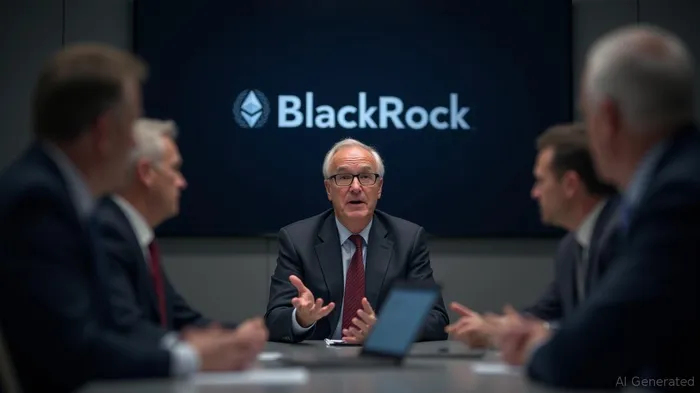BlackRock Pushes for Ethereum Staking ETF Approval by SEC
BlackRock, a prominent global asset manager, is actively pushing for the approval of an Ethereum staking ETF by the U.S. Securities and Exchange Commission. This proposal is not merely for a spot ETF but aims to integrate Ethereum’s proof-of-stake functionality into a regulated investment product. This means investors could gain exposure to ETH and receive staking rewards without directly holding or managing the asset. This approach would allow BlackRockREM-- to offer a yield-generating instrument that mimics Ethereum’s native staking mechanism. If approved, it would mark a significant step forward in bringing decentralized finance closer to traditional capital markets. BlackRock’s persistent engagement with regulators reflects the firm’s growing focus on tokenization, on-chain yields, and institutional crypto access.
The proposal is seen as a response to shifting market dynamics and investor demand for blockchain-based income products. It also signals that institutional players now view Ethereum not just as a speculative asset, but as infrastructure that can be packaged into traditional financial vehicles. BlackRock’s move is viewed as both a regulatory test and a potential game changer. This move by BlackRock, one of the world's largest asset managers, underscores a strategic pivot towards Ethereum, which has been gaining traction as a viable investment option. The push for an Ethereum staking ETF is not just about diversifying investment portfolios but also about tapping into the unique benefits of Ethereum's staking mechanism, which allows investors to earn rewards by participating in the network's consensus process.
If the SEC grants approval, the ETF could reshape how investors approach Ethereum. Currently, staking requires technical knowledge, direct custody of assets, and some degree of risk. A staking-enabled ETF would eliminate those barriers, allowing exposure through a familiar vehicle. This accessibility could invite billions in institutional capital that has so far stayed on the sidelines. By embedding staking yields into the ETF structure, BlackRock could introduce a new class of passive income products. This would especially appeal to investors seeking yield in a low-interest rate environment. More importantly, it could attract traditional retirement and portfolio managers, many of whom remain hesitant to enter DeFi platforms.
This move may also influence how other proof-of-stake tokens are packaged and regulated. If successful, we may see similar ETF applications involving Solana, Cardano, or Polkadot in the near future. The integration of staking into institutional products could accelerate the convergence of traditional finance and decentralized ecosystems. In the long term, it may even impact Ethereum’s price stability and demand cycles. The potential approval of Ethereum staking ETFs could open new avenues for investment, potentially boosting demand and price stability for Ethereum. This development is particularly noteworthy given the recent trends in the crypto market, where Ethereum has shown a notable increase compared to Bitcoin's more stable performance. This surge in Ethereum's value relative to Bitcoin indicates a shift in investor preference, with more capital flowing into Ethereum as investors seek higher returns and diversify their portfolios.
The Ethereum staking ETFs, if approved, would provide U.S. investors with a regulated and accessible way to gain exposure to Ethereum's staking ecosystem. This is a significant step forward, as previous attempts to launch similar ETFs have faced regulatory hurdles. The filing by REX Shares for Ethereum and Solana staking ETFs further supports this trend, suggesting that the regulatory environment may be becoming more favorable for crypto investments. However, the broader market dynamics also play a crucial role. Global macroeconomic concerns, including interest rate hikes and regulatory uncertainties, continue to influence the crypto market. Despite these challenges, the push for Ethereum staking ETFs by major financial institutions like BlackRock signals a growing confidence in the long-term potential of digital assets. This confidence is further bolstered by the recent investment strategies of companies like SharpLink Gaming, which has allocated a significant portion of its funds to an Ethereum treasury. Such moves by institutional players are likely to attract more capital into the Ethereum ecosystem, potentially driving further growth and innovation.
In summary, BlackRock's advocacy for an Ethereum staking ETF represents a transformative shift in the crypto investment landscape. This move, coupled with the recent trends in the market and the strategic investments by major institutions, indicates a growing acceptance and integration of digital assets within traditional finance. As the regulatory environment continues to evolve, the approval of Ethereum staking ETFs could pave the way for more institutional involvement in the crypto market, potentially leading to increased demand and price stability for Ethereum.

Quickly understand the history and background of various well-known coins
Latest Articles
Stay ahead of the market.
Get curated U.S. market news, insights and key dates delivered to your inbox.

Comments
No comments yet